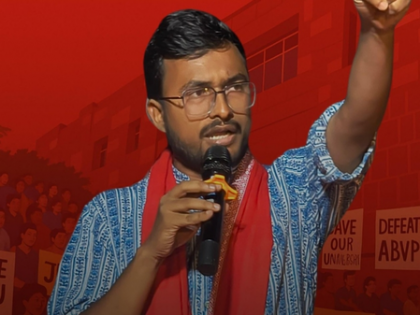JNU students' union chief seeks data on armed forces personnel casualties in Operation Sindoor
By IANS | Updated: May 23, 2025 00:02 IST2025-05-22T23:59:46+5:302025-05-23T00:02:54+5:30
New Delhi, May 22 JNU Students' Union President Nitish Kumar has raised serious concerns about the government’s handling ...

JNU students' union chief seeks data on armed forces personnel casualties in Operation Sindoor
New Delhi, May 22 JNU Students' Union President Nitish Kumar has raised serious concerns about the government’s handling of recent military developments, particularly in relation to “Operation Sindoor” and the Pahalgam terror attack.
Expressing frustration over the lack of transparency, he pointed out that while the nation continues to witness the arrival of soldiers’ mortal remains from different regions, there is still no official data on the exact number of casualties suffered by the Indian Army.
In an exclusive interview with IANS on Thursday, Kumar demanded that the government provide accurate figures, stating that the people have a right to know the true cost of conflict.
While unequivocally condemning the terror attack in Pahalgam, he criticised the government’s swift military response against Pakistan, arguing that the move appeared pre-planned and sidestepped accountability for serious internal security lapses.
At a time when India and Pakistan -- both nuclear-armed nations -- stand at odds, he emphasised the need for de-escalation and diplomacy rather than war rhetoric. Kumar also voiced concern over the alarming rise in communal violence following the attack, particularly incidents targeting Muslims.
He accused the government of failing to curb the growing hate and instead fuelling a polarising narrative. Calling for a diplomatic offensive rather than full-scale warfare, he suggested that isolating Pakistan internationally for harbouring terrorists would be a more effective and sustainable approach.
"The way our defence forces have responded in various ways after the initial attacks -- yes, that was shown -- but now we see Pakistan claiming that the attacks were not just on military targets but also on civilian areas. Though Pakistan's claims don't matter, the point remains that Pakistan has, time and again -- be it the 2008 Mumbai attacks, earlier incidents, or even the Kargil War -- been responsible for sheltering terrorists. But the real question is: should such incidents be resolved through full-blown war, or should efforts be made to diplomatically isolate Pakistan in today’s context?" Kumar asked.
He cited past incidents, including those in 2018, as evidence that military action alone has repeatedly failed to break the cycle of violence.
Raising the possibility of a conspiracy to disturb internal peace, Kumar warned that such attacks and the reactions they provoke often lead to increased communal tensions, playing directly into the hands of forces seeking to divide the country.
"Of course, it could be a conspiracy. If such an attack has been carried out, then somewhere it is also aimed at disturbing the internal peace of the country -- to increase communal tension. This has often happened in the past, where such incidents are deliberately orchestrated to create unrest within the country,” he said.
In his concluding remarks, Kumar challenged the government to clarify whether the military strikes had achieved their intended goals -- whether the Pahalgam attackers were truly neutralised and if the situation in Kashmir, particularly in terms of safety and tourism, had improved.
While he welcomed the Army's decision to hold a press briefing, he criticised sections of the media for spreading misinformation, calling out what he termed as "Godi Media" for fuelling jingoism by irresponsibly reporting attacks on Karachi and Islamabad.
He stressed that the nation needs truth, not theatrics. Kumar reiterated his concerns about the lack of clarity regarding the exact number of casualties suffered by the Indian armed forces in the recent wave of violence. He noted that while the country mourns the arrival of soldiers’ mortal remains, the government has yet to present a clear and official account of the losses.
“The Pakistani army has claimed that they inflicted significant damage, but on our side too, the Indian Army has suffered losses. We have not received any clear data on how many soldiers have been martyred. We are only seeing mortal remains arriving in different regions, but there is no official number of the martyrs. This is something the Army must clarify,” he said.
Kumar condemned the terrorist strike but also criticised the government’s handling of the situation post-attack, particularly the surge in "communal tensions".
He emphasised the dangers of escalating hostilities between India and Pakistan and advocated for a diplomatic, internationally coordinated effort to isolate Pakistan if it continues to harbour terrorists. Stressing that war disproportionately impacts the poor, he cautioned against using full-scale military retaliation as a solution and instead called for strategic, long-term measures.
He also pointed out that incidents of communal violence and misinformation through sections of the media further weaken national unity and distract from the real issue—ensuring the safety and security of every Indian citizen, particularly in sensitive areas like Kashmir.
Disclaimer: This post has been auto-published from an agency feed without any modifications to the text and has not been reviewed by an editor
Open in app